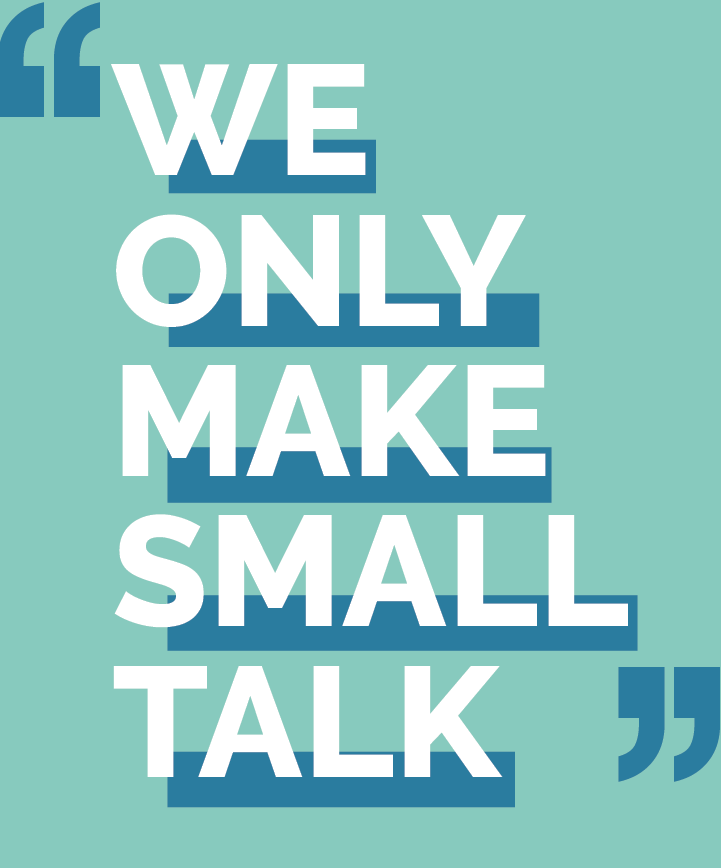We only make small talk
Why we should be more open to conversing freely with strangers
April 10, 2019
nteracting with strangers can be terrifying. We’re rarely in physical danger when meeting someone new, but our dignity is on the line.
In many cases, interacting with someone new can feel like we’re following a set of procedures, progressing from one stage to the next as we gradually become more comfortable. We start with a collection of pre-written social scripts shaped by what others have said and done countless times before us. Awkward handshakes, accidental eye contact and prolonged silence can make conversation with new people scary, and even the smallest mistake can make it feel like the whole world is falling on us.
We break the ice with someone unfamiliar by commenting on the weather, asking about school or talking about weekend plans. When with strangers, this is about the depth that our conversations reach. But if we want to move beyond that level, conversations continue until we eventually cement our friendship and become comfortable enough to share inside jokes and spend time outside of school together.
But something we rarely consider is that we can cut out all the time it takes to go from talking about school to laughing together and sharing an intimate, personal conversation. We don’t need to follow a linear progression of our interactions. Instead, we should view interactions as a group of doors, a set of options to choose from. There’s nothing wrong with including someone we don’t know in a conversation with our friends.
Few people actually try to achieve this, but for those who do, there are more opportunities to form lasting relationships. Sophomore Andrew Richardson has adopted a mindset of always trying to get to know new people, often inviting them to join conversations with friends. Richardson has been honing this skill since he joined Boy Scouts in sixth grade, and it has allowed him to meet many new people.
“When you’re able to meet new people, you’re able to practice with different styles of socializing,” Richardson said. “When I started getting out of my typical friend group zone, I learned more skills about how to interact with people.”
Additionally, conversing with new people throughout the day can lift our mood and make our day more positive. Two University of Chicago scientists found that when Chicago train commuters interacted with a stranger rather than riding in solitude, their commute was much more engaging and positive.
Richardson agrees, recalling how an unexpected introduction from a new classmate led to one of his strongest friendships. He met sophomore Nishanth Arumugan in sixth grade after Arumugan approached him during a break in class. He simply walked up to Richardson and introduced himself: “Hi, my name’s Nish.” Despite the straightforward introduction, Arumugan left a lasting impression on Richardson. When Richardson returned home, he told his mother he made a new friend.
“I feel like that [conversation] has made an impact on me,” Richardson said. “I still remember it to this day and it’s shaped some of the ways I’ve tried to learn to talk to people and open up conversations because I remember back then it was a great feeling to have someone come up and take the lead and just introduce themselves.”
Starting a conversation can be as simple as saying hello and can lead to life-changing relationships, but many of us find it difficult to introduce ourselves and open up to new people. And even if we are able to begin the conversation, it is extremely easy to fall into awkward silence and let the conversation come to a grinding halt.
Many times, we fall short of comfortable conversation due to our lack of investment in getting to know new people. We force ourselves into introductions and focus mostly on small talk, tiptoeing around more personal details and rushing to goodbyes as fast as we can. Or we might overthink our self-introductions, imagining dozens of ways our conversation could go wrong before even attempting to hold it, eventually dissuading ourselves from engaging with others altogether.
But imagine the possibilities if we ditched the small talk and instead talked openly with new people. If we dropped our façade, deciding to comfortably converse with one another, we could avoid painful minutes of awkward conversation and make more friends. Connecting with people could be easier — and if we don’t click with someone, we would know that right away and save our time from pointless small talk, and if we hit it off with someone, a relationship could form and strengthen rapidly.
It may be awkward at first. Richardson acknowledges that certain conversation topics or inside jokes require a certain comfort level to bring up, and mentioning them in certain situations may be inappropriate. But he believes the shift in the way we approach conversations is necessary to work towards.
“If everyone could start off [at a comfortable level], I think the world would be a great place for everyone to live,” Richardson said. “But you know, reality isn’t perfect, and we all have to start somewhere.”





























